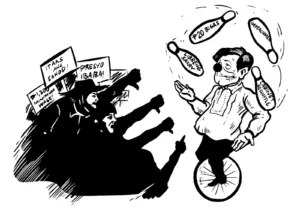The national budget approved by the bicameral committee of the Senate and Congress in the first week of December drew widespread condemnation. In the final version, the committee slashed funds for social services and transferred it to milking cow programs such as infrastructure projects and aid, which serve patronage politics.
The committee inserted a total of ₱860.5 billion for the 2025 budget, where ₱487.5 billion is for funds realignment and ₱373 billion are “unprogrammed funds.”
The most notable in the “realignment” is the bicameral committee’s reinclusion of the Ayuda sa Kapos sa Kita Program (AKAP) which the Lower House leadership proposed but was removed in the Senate version. The committee allocated ₱26 billion for the program, more than half the original amount of ₱39 billion. If divided among themselves, congressman will each get ₱83 million, while each senator, ₱208 million. If the party-list representatives were not given a share, each district representative will receive ₱103 million. To complete the funds, the allocations for the labor and social work departments were reduced.
The pretext of bureaucrats for the AKAP is to provide assistance to low-income families affected by high inflation rates. This is in addition to many existing assistance programs such as the Pantawid Pamilyang Pilipino Program (4Ps), Assistance to Individuals in Crisis Situations, TUPAD, and other programs, which politicians have long used to expand influence and buy votes.
More than AKAP, the committee increased the funds for the Department of Public Works and Highways by ₱288.65 billion, which inflated the budget to ₱1.11 trillion, the largest allocation in the department’s history, and the largest in the entire budget.
The bureaucrats also raised the unprogrammed funds or funds without a specific source, which the president’s office will handle and manage. From the original ₱158.7 billion, the committee inserted an additional ₱373 billion, bloating the funds by more than half a trillion. This fund is actually the president’s “pork barrel” which his cronies are expected to use to secure the loyalty of the bureaucrats for the upcoming election.
To secure the military’s loyalty, the committee raised the soldiers’ daily allowance (apart from salary) from ₱150/day to ₱350/day for a total of ₱10,500/month. This allocation increase is unmatched by any other government employee. The committee also maintained the ₱4.5 billion allocation for the NTF-Elcac.
Conversely, the DepEd budget was reduced by ₱12 billion. The already meager DoH funds was also reduced by ₱25.80 billion, and the Commission on Higher Education funds by ₱26.91 billion. The University of the Philippines budget was reduced by a total of ₱2.93 billion, the largest cut in nearly a decade.
The budget for agriculture was also reduced by ₱43.2 billion (₱20 billion from the agriculture department and ₱23.2 billion from the National Irrigation Administration).
Meanwhile, the committee retained no single centavo for Philhealth, which Congress initially set at ₱74.43 billion. This effectively removed the government subsidy for patients who are unable to pay for hospitalization and placed this entirely on members. This highlights the nature of Philhealth as a private entity directly funded by ordinary workers and employees, and the state’s abandonment of its responsibility in public health.
The ₱500 million budget slashed from the vice president’s office was not restored amid attempts of Sara Duterte’s allies to reinsert it. Nor was it given confidential and intelligence funds (CIF) while the huge CFI for Ferdinand Marcos Jr’s office was retained.











